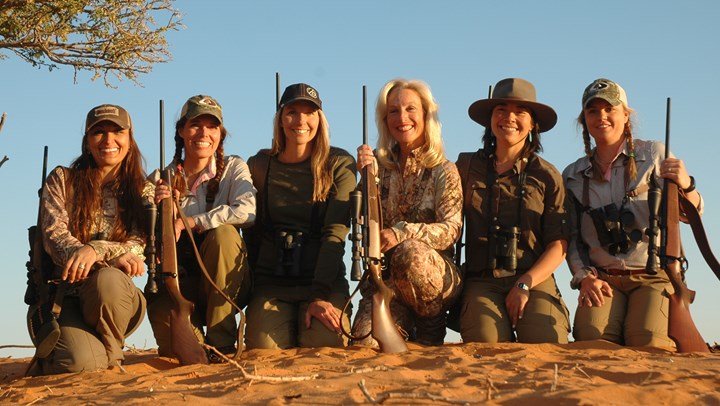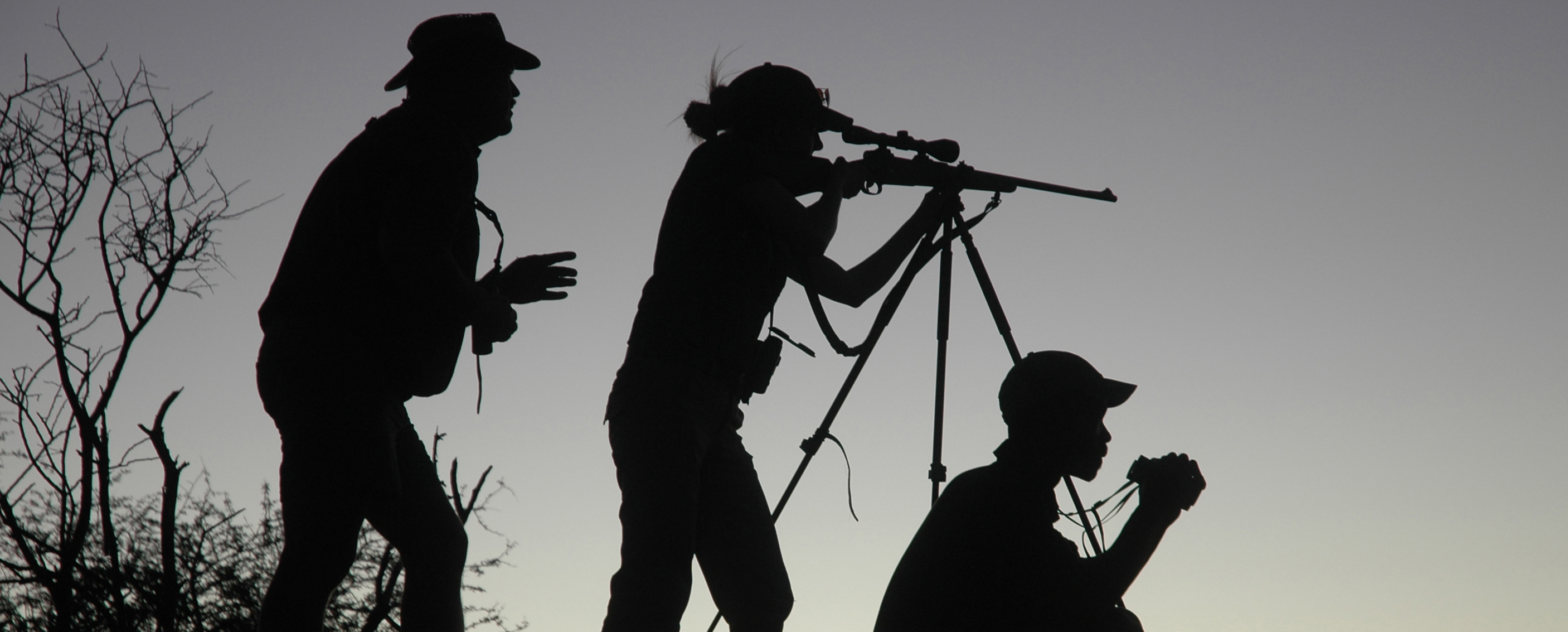
by Wayne van Zwoll - Thursday, May 18, 2017

“This is the most beautiful wildebeest in all Africa.” Vickie stroked the brindled hide. She wasn’t talking about the bull’s horns. It was her first big game animal. Her reverence reminded me that common game is not unremarkable—that each animal is instead significant. Week-long effort had yielded this shot. Vickie has since earned many more.
A vocal ambassador for hunting, Vickie counts herself a Safari Sister. In groups of three to eight, women from all walks of life have come together in sub-Saharan Africa for adventure most assumed they would never have—or even want.
“I don’t know if I could shoot an animal.” It’s a heavy thought, that of taking a life. I empathize. In fact, women with such reticence impress me. Hunters who shoot with mechanical indifference offend people who’ve not killed, and disappoint many of us who have. They hardly represent what hunting has to offer, or the good that it does for wildlife. A hunt may yield a kill; it can’t be defined by a carcass.
I remind women who question their place on safari or behind a rifle that film and video offer less costly views of Africa, but only a spectator’s. A safari puts you inside an ecosystem. You’re a participant, and beyond that, a predator. To understand hunting, a form of predation, you must earn the chance to kill, then decide to fire or decline the shot. Anti-hunters need not apply, but neither is killing a requisite.
To date, every Safari Sister has killed game. The resulting change in perspective can be profound.
As a game-bird biologist, Leslie understood the role of hunting in conservation, but she had never fired a rifle bigger than a .22. “It’s just not me,” she’d shrugged. Then, in the other-world that only those who’ve visited Africa can know, the thorn parted. A magnificent kudu bull ghosted from shadow into the peach light of a Namibian dusk. Her .30-06 clenched tight to the sticks, Leslie exhaled, squinted, decided. Bang! The bull lunged and nosed into the sand. Leslie knelt, touched the long corkscrew horns. “Oh.” She paused. “Oh.” Another silence. “I had no idea.” She wiped a tear.
"The reactions of Safari Sisters returning from Africa show changed lives and deeper appreciate for wildlife, wild places and the world of hunting in conserving them."These women-only safaris began nearly 20 years ago on a Utah ridge, when Janet triggered a shot that felled a truck-shouldered bull elk. I had brought her to that place. “More women should do this,” she said as I put my knife to work. I pointed out it was a costly hunt. But she wasn’t dissuaded. The following June she a led a group of Pennsylvania women to that mountain, to see elk on their calving grounds and to participate in an outdoor skills program we labeled “High Country Adventures.” It featured rifle, pistol, shotgun and black powder shooting, fly fishing, orienteering, wilderness medicine, nature photography and horseback riding. The outdoors industry was quick to loan and donate gear. Courses and instructors got rave reviews. We repeated, adding an overnight trail ride in Wyoming. Still, hunting was untenable. Then Jamy Traut, a Namibian outfitter with whom I’d hunted, agreed to host an HCA Safari. “We can’t charge over cost,” I said. “This is a mission, not a business.”
A decade later, dozens of women have become Safari Sisters, in camps from northern Namibia to South Africa’s Eastern Cape, where Crusader Safaris put the elusive nyala in their sights. Tracking rhinos and elephants on foot, cameras in hand, they felt the humility, the frailty plain to all hunters on the trail of dangerous game. Beyond that, they showed a selflessness rare in camps dominated by men.
“I’ll loan you my rifle.” I almost insisted. Cathy’s was days late, after a baggage booboo that sent it to Arizona instead of Africa. She demurred. “I’ll let the others hunt. It’s great fun watching them. All I miss is the shooting!” A most generous spirit! When at last Cathy’s rifle arrived, she downed three fine animals with three shots.

“I’ve come to like these safaris,” confided a PH. “These women are pleasant.” He stopped shy of saying they spared him endless tales of their own prowess. Instead: “They don’t talk like men.”
Much is said of the camaraderie in hunting camps. It is nowhere more evident than among Safari Sisters. By the way, they came up with that name. Unassuming, unpretentious. A nod to close bonds knit quickly in places far from home.
Three women so far have chosen to hunt with bows and arrows—a testament to their willingness to accept failure. They took two kudu and two gemsbok. One archer, waiting by a trail, got a bonus when a black rhino passed her at 12 steps. “I saw every crack in the mud on its hide! I hardly dared breathe!” Savoring surprises and appreciating the incidental, Safari Sisters impress people accustomed to hunters keen to kill many animals and measure each horn.
One morning a dung beetle strafed us. Cursed by stubby wings and the aerodynamics of a brick, it careened through the air, landing with the grace of falling fruit. We gathered to watch the beetle climb a pile of fresh elephant dung, tearing at it with vigor and rolling shreds into a marble-size ball. Muscling it across the sand, the creature entered a small burrow. It emerged nose first, shoving sand like a bulldozer to finish the excavation. The dung-marble slipped into the burrow as neatly as a ball bearing down a race. “Larvae will hatch inside and feed on that dung,” explained our PH. This lesson in natural history sparked as much talk over sun-downers as did the big game taken that day.
The aim of HCA Safaris is to bring Africa’s bush to women who’d not otherwise see it. Keeping total cost below one-third market value is an enduring challenge. Outfitters, fortunately, have found that women introduced to Africa return with husbands and friends. Larry and Brenda Potterfield of Midway USA have generously supported HCA since its inception.
Rifles for women who’ve never fired one? What about training? Some Safari Sisters have hunted, and bring their rifles. “A gift,” said Amber of her shiny new 7mm-08. Like her camp-mates, she checked zero at our bench, then practiced firing from field positions. Her priority: a big warthog—a tough creature to bag in thick bush. He moves little during the day, avoids openings, is easily spooked and rarely stops to look back. But one boar made a mistake. Amber’s bullet struck mid-rib, angling forward. We raced ahead on the track and found the animal lying still. We approached cautiously. At Amber’s “make sure” shot the pig vaulted to life in a tornado of dust! Exciting seconds and another softnose later, she was grinning over one of the most impressive warthogs I’ve seen.
Tamar borrowed a .270, a long suppressor giving it a cannon-like look in the hands of the slender young woman. But she handled it deftly, and on the range soon punched bullseyes. Afield, she dropped a lovely impala, then, on the final evening, a stunning kudu bull. “I’ll be back!” she promised. True to her word, she has since made four additional safaris, two with HCA. As this is written, she’s about to host her husband and son on their first African safari!
Because hunting is a deeply personal experience, there’s no predicting how anyone will respond to the taut moments of a stalk, to crosswire quivering against rib, a rifle’s blast, the collapse of a big game animal. Until you’ve hunted, you can’t know the imperatives of a predator, the weight of your decision to kill, the sting of failure. Hunting probes convictions, demands sharp focus. No appeals. No repeals.
The reactions of Safari Sisters returning from Africa show changed lives and deeper appreciation for wildlife, wild places and the role of hunting in conserving them. Some who had never before carried a rifle say they feel oddly incomplete without one! They recall in stories to the uninitiated the kaleidoscope of events and creatures that make a safari more than a hunt for big game. Mused one, “It’s a window into another time, isn’t it? Another way of life.” Certainly, it’s more than a vacation to a place most women think they will never see.
For more information on High Country Adventures Safaris, key up highcountrywomen.com or phone 509-686-9051.
■ ■ ■
Editor's Note: Wayne van Zwoll organized and conducted the first HCA camps and hosts every HCA Safari. A full-time journalist, Wayne has published 16 books and nearly 3,000 magazine articles on hunting and shooting. He earned a PhD in wildlife policy and now lives in north-central Washington State.
E-mail your comments/questions about this site to:
[email protected]
